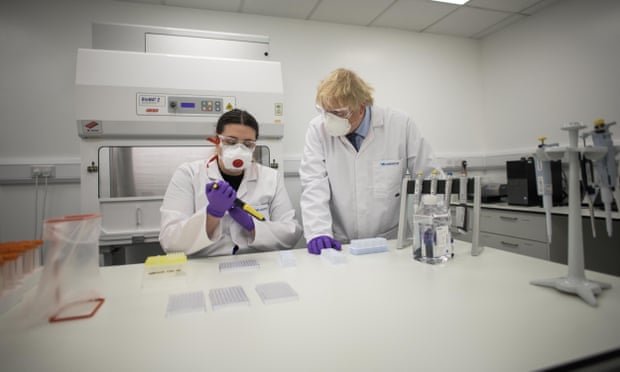
UK vaccine strategy 'paying off' as latest trials boost stockpiles
Britain has cemented its status as one of the world’s leading buyers of effective Covid vaccines after two more pharmaceutical companies reported positive trial results – potentially growing the UK stockpile by 90m doses.
The US drugmaker Johnson & Johnson announced on Friday that its vaccine – which requires only one dose – is effective. This followed Thursday’s news that the Novavax vaccine, which will be manufactured in the UK, performed well in phase 3 trials.
The UK’s vaccines taskforce has pre-ordered 30m doses of the Janssen vaccine, produced by Johnson and Johnson via its Belgian subsidiary, and 60m Novavax doses, which will be administered as two doses per person if it gets regulatory approval. Both can be stored at fridge temperatures.
In total, the UK has procured 247m vaccine doses from companies with positive phase 3 results: roughly 3.7 jabs per person, Guardian analysis has found. Canada, Chile, Australia and New Zealand are the only countries with a higher rate per head, according to data from Duke Global Health Innovation Center including contracts signed up to 25 January.
While both the US and the EU have procured more than 1bn effective doses each, these numbers equate to lower rates of 3.4 and 2.4 per person. The UK has placed orders for a further 120m vaccines from Sanofi-GSK and Valneva, but these still await positive trial results.
Johnson & Johnson said its vaccine had 72% efficacy in preventing Covid in US trials, but a lower rate of 66% was observed globally in a large trial conducted across three continents and against multiple variants.
It gave people 85% protection against severe illness, even in South Africa, which is struggling with a problematic variant of the virus. The vaccine gave 100% protection against hospitalisation and death, as do the other vaccines now approved.
The health secretary, Matt Hancock, said the news meant the UK was in “pole position” in the race to protect its population against the virus. “Our approach of buying abroad and making here at home is paying off,” he said.
With case rates and hospitalisations still at high levels, ministers are keenly awaiting data on the impact of the vaccine rollout on the spread of the virus, which should begin to emerge in the next fortnight.
Boris Johnson has signalled he will wait until the week of 22 February, when more evidence will be available, before making firm decisions about lifting schools closure or other lockdown measures. The latest NHS figures, published on Friday, showed that 6.8 million people have now received their first dose of Covid vaccine in the UK.
Some health experts are calling on the UK government to consider sharing its vaccine supplies with other countries, including the EU, given the shared imperative of tackling the virus worldwide.

Dr Alberto Giubilini, from the Oxford Uehiro Centre for Practical Ethics at the University of Oxford, said: “I think that the more vaccine doses we have in the UK, the stronger the reason to give some to the EU. It is not just about being generous, it is to make sure that the problem is addressed at the collective level, which is the only level at which it can be addressed if we want long term positive outcomes.”
A government source insisted it was too soon to contemplate whether the UK might have surplus doses, however – pointing out that the two newest vaccines must still await the approval of the regulator. “There is no expectation that we will have excess levels of supply, because of the time lag,” they said.
Vaccine availability remains the constraint on the speed of the immunisation programme, with some regions reporting inconsistent supplies. Hancock has also made clear he believes the public may need to be re-vaccinated in a year’s time, or perhaps sooner, as more evidence emerges about how long protection lasts.










